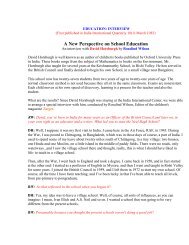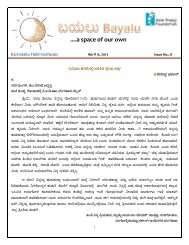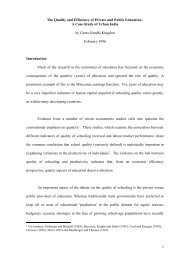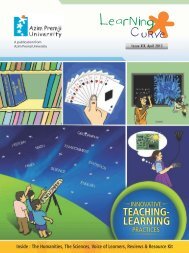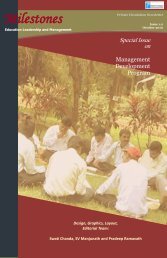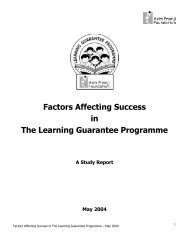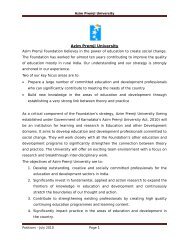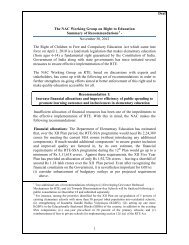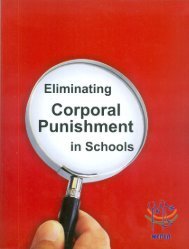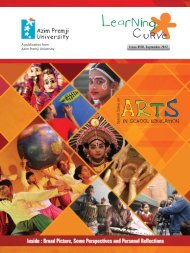Indesign Pagesnew.indd - Azim Premji Foundation
Indesign Pagesnew.indd - Azim Premji Foundation
Indesign Pagesnew.indd - Azim Premji Foundation
Create successful ePaper yourself
Turn your PDF publications into a flip-book with our unique Google optimized e-Paper software.
events and accomplishments in British history. At present,<br />
a debate has been re-ignited about whether more British<br />
history should be taught in schools with the express aim<br />
of encouraging a greater sense of “Britishness” (which is<br />
seen as more inclusive than, for example, “Englishness” or<br />
“Welshness”). Several prominent historians have criticized<br />
the relative weight given to topics such as Nazi Germany and<br />
America’s Great Depression in comparison to topics of direct<br />
national signifi cance. They have also criticized the piecemeal<br />
nature of the curriculum which does not allow students to<br />
develop a coherent overarching story about the past.<br />
History as a ‘Discipline’ vs. History as ‘Content’:<br />
Debates about How History should be Taught<br />
One reason why students in England study relatively little<br />
British history is that the principle purpose of studying the<br />
past is not seen to be about promoting patriotism. From<br />
the 1960s onwards ‘new’ history gained traction with<br />
English education experts and teachers. In a nutshell, ‘new’<br />
history was a response to ‘traditional’ history which critics<br />
said taught students to memorize rather than to think.<br />
Advocates of ‘new’ history pushed for a greater emphasis<br />
on ‘history from below’ rather than on national politics and<br />
military campaigns; they also wanted to see more non-<br />
British history in the curriculum and increased attention paid<br />
to the perspectives of different participants in events. They<br />
favored in-depth studies of particular themes or moments<br />
from history rather than extensive chronological sweeps<br />
of the past. The Schools history Project (SHP), founded in<br />
1972, was a key proponent of the ‘new’ history approach<br />
and its syllabi were popular with teachers (who were free<br />
to choose their own curricula pre-National Curriculum);<br />
today SHP is still infl uential, particularly as the National<br />
Curriculum, despite furious protests from the right, ended<br />
up incorporating many aspects of ‘new’ history.<br />
Although debates about ‘new’ and ‘traditional’ approaches to<br />
teaching history have generally fallen out along political lines<br />
in England, ‘new’ history is not necessarily about promoting<br />
a left-wing or populist agenda. Instead, it is about focusing<br />
on history as a dynamic discipline or way of knowing about<br />
the world rather than a collection of hard and dry facts. To<br />
understand the past, students are encouraged to think like<br />
historians: analyzing historical evidence, considering different<br />
historical interpretations, constructing arguments about why<br />
something happened or stayed the same, and/or considering<br />
Section B<br />
Issues in History Education: Perspectives from England and the USA<br />
the signifi cance of particular events or developments. It<br />
is important to note that substantive knowledge about the<br />
past—or ‘content’—is vitally important for developing a<br />
disciplinary understanding of history; it is just not the beall<br />
and end-all. While some critics have lambasted the idea<br />
of trying to create mini-historians when the vast majority<br />
of students will not become professional historians, others<br />
have argued that it benefi ts all students to learn to think<br />
critically about the past and how we know about it. Indeed,<br />
the aspiration to teach history as a discipline is in line with<br />
the appeal made by many prominent educators in the West<br />
to teach for deep understanding across all aspects of the<br />
school curriculum.<br />
Although debates about ‘new’ and<br />
‘traditional’ approaches to teaching history<br />
have generally fallen out along political lines<br />
in England, ‘new’ history is not necessarily<br />
about promoting a left-wing or populist<br />
agenda. Instead, it is about focusing on<br />
history as a dynamic discipline or way of<br />
knowing about the world rather than a<br />
collection of hard and dry facts.<br />
Although the idea of teaching history as a discipline is<br />
starting to make some inroads in America (and has long<br />
been present in some classrooms), the majority of teachers<br />
and administrators continue to take a ‘traditional’ approach<br />
toward history education, closely following textbook content.<br />
Prominent history education experts in North America—<br />
such as Sam Wineburg (USA) and Peter Seixas (Canada)—<br />
advocate an ‘inquiry-based’ or disciplinary approach to history<br />
education, arguing that such an approach enables students<br />
to develop sophisticated historical understanding as well as<br />
a keen interest in history. Their research, alongside that of<br />
English researchers (e.g. Peter Lee, Denis Shemilt and Ros<br />
Ashby), has also highlighted that students’ thinking about<br />
history is often counterintuitive and that students need<br />
to be supported and challenged to develop powerful and<br />
productive ideas about history. For example, many students<br />
Pg No: 73



